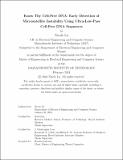Know Thy Cell-Free DNA: Early Detection of Microsatellite Instability Using Ultra-Low-Pass Cell-Free DNA Sequences
Author(s)
Lu, Nicole
DownloadThesis PDF (8.981Mb)
Advisor
Getz, Gad
Love, J. Christopher
Terms of use
Metadata
Show full item recordAbstract
Microsatellites are short segments of repeated DNA motifs (i.e., base pair patterns) that are widespread in our genomes. Microsatellites are inherently more mutable than other genomic locations, and since cancer cells undergo many more cell divisions, microsatellites are useful for distinguishing tumor DNA from normal (non-cancerous) DNA.
Microsatellite instability (MSI) arises as a result of mismatch repair deficiency (MMRD), wherein a patient loses function of both copies of certain genes related to mismatch repair.
Current MMRD diagnostics rely on deep sequencing of tumor tissue samples, which can be expensive and overly-invasive to perform for early or routine screening. Less expensive sequencing methods such as ultra-low pass (ULP) sequencing exist, but thus far have not been utilized for detection of microsatellite instability. In this thesis, we focus on 0.1× ULP sequences, in which about 10% of the genomic locations have one read in expectation. Having so few reads makes it difficult to differentiate experimental noise from true mutations. Similarly, cell-free DNA (cfDNA) are DNA fragments from cells all over the body, which circulate in the blood. Collecting and sequencing cfDNA is much less invasive than collecting tissue samples, but presents another challenge in that the fraction of DNA fragments from any particular cell (or group of cells) is low. Thus, if cancerous cells exist within the body, its representation in a given cfDNA sample is likely low. Together, these challenges present a obvious trade-off between signal strength and cost/invasiveness for screening and detection of MSI.
This thesis focuses on the implementation, validation, and additional research of a computational tool to detect microsatellite instability in ultra-low pass cell-free DNA samples.
Date issued
2024-02Department
Massachusetts Institute of Technology. Department of Electrical Engineering and Computer SciencePublisher
Massachusetts Institute of Technology